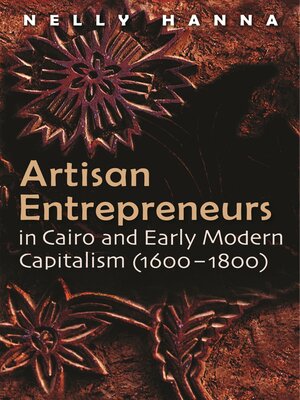Artisan Entrepreneurs in Cairo and Early-Modern Capitalism (1600–1800)
ebook ∣ Middle East Studies Beyond Dominant Paradigms
By Nelly Hanna

Sign up to save your library
With an OverDrive account, you can save your favorite libraries for at-a-glance information about availability. Find out more about OverDrive accounts.
Find this title in Libby, the library reading app by OverDrive.



Search for a digital library with this title
Title found at these libraries:
| Library Name | Distance |
|---|---|
| Loading... |
Little has been written about the economic history of Egypt prior to its incorporation into the European capitalist economy. While historians have mined archives and court documents to create a picture of the commercial activities, networks, and infrastructure of merchants during this time, few have documented a similar picture of the artisans and craftspeople. Artisans outnumbered merchants, and their economic weight was considerable, yet details about their lives, the way they carried out their work, and their role or position in the economy are largely unknown. Hanna seeks to redress this gap with Artisan Entrepreneurs in Cairo and Early Modern Capitalism (1600–1800) by locating and exploring the role of artisans in the historical process.
Offering richly detailed portraits as well as an overview of the Ottoman Empire's economic landscape, Hanna incorporates artisans into the historical development of the period, portraying them in the context of their work, their families, and their social relations. These artisans developed a variety of capitalist practices, both as individuals and collectively in their guilds. Responding to the demands of expanding commercial environments in Egypt and Europe, artisans found ways to adapt both production techniques and the organization of production. Hanna details the ways in which artisans defied the constraints of the guilds and actively engaged in the markets of Europe, demonstrating how Egyptian artisan production was able to compete and survive in a landscape of growing European trade.
Deftly synthesizing a wide range of economic and historical theory, Hanna reinvigorates the current scholarship on early Ottoman history and provides a persuasive challenge to the largely shallow perception of artisans' role in Egypt's economy.







